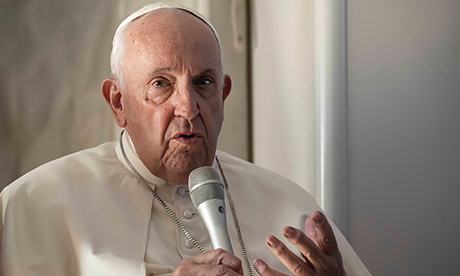Speaking to reporters on the plane returning from a four-day trip to Bahrain, Pope Francis, Sunday, praised the women he has appointed to managerial jobs in the Vatican.
They have had improved things there, he said.
One he mentioned by name was Sister Raffaella Petrini, who as the deputy governor of Vatican City is effectively the most powerful woman there.
“I have noticed that every time a woman is given a position (of responsibility) in the Vatican, things improve,” he said.
He also cited the impact of five women he appointed to a department that oversees Vatican finances.
“This is a revolution (in the Vatican) because women know how the find the right way to go forward,” he said.
Francis also has appointed women as deputy foreign minister, director of the Vatican Museums, deputy head of the Vatican Press Office, as well as four women as councillors to the Synod of Bishops, which prepares major meetings.
He made no mention of campaigns to let women become clergy. Like his predecessor, Francis says the question of women priests is closed.
The Church teaches that only men can become priests because Jesus chose men as his apostles.
Responding to a question about women protesting in Iran, he turned to the topic of women’s rights in general.
“We have to tell the truth,” he said.
“The struggle for women’s rights is a continuing struggle.
“We have to continue struggling for this because women are a gift. God did not create man and then give him a lapdog to play with. He created both equal, man and woman.
“A society that is not capable of (allowing women to have greater roles) does not move forward,” he added.
Denouncing male chauvinism and acknowledging there was still too much of it around the world, including in his native Argentina, Francis said “chauvinism kills humanity”.
He also condemned as a “criminal act” female genital mutilation (FGM).
He went on to repeat a call he made earlier this year on the UN International Day of Zero Tolerance for Female Genital Mutilation.
According to the United Nations, FGM is concentrated in about 30 countries in Africa and the Middle East. It is also practised by immigrant populations elsewhere.
Over four million girls are at risk of undergoing FGM this year, according to the UN.
Source
